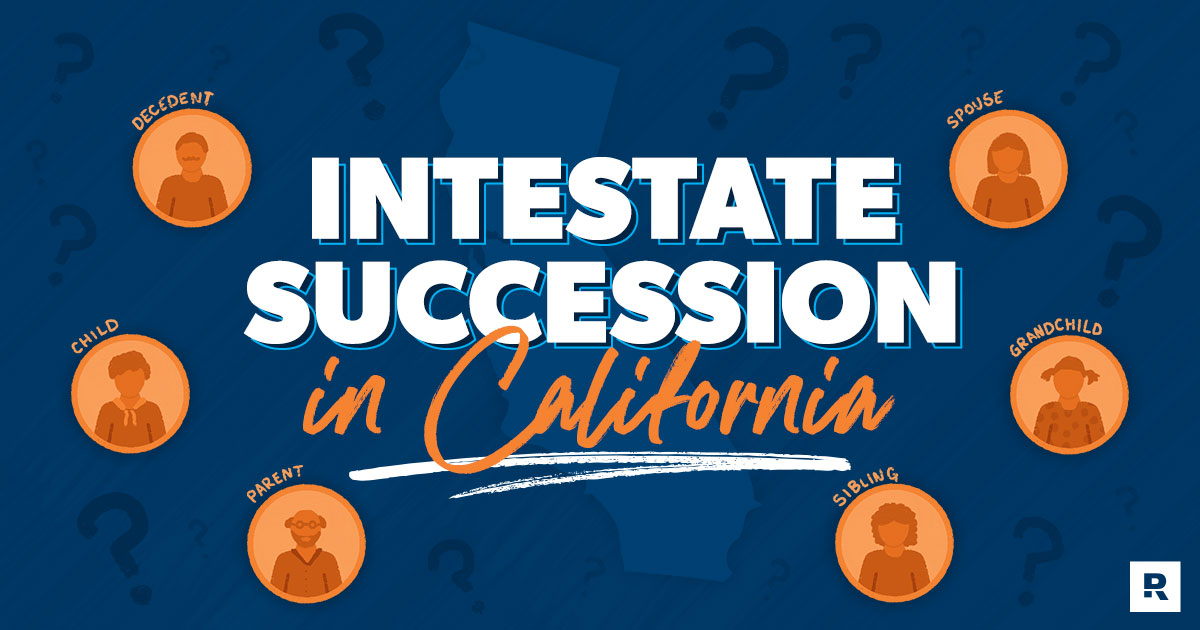California Intestate Succession
7 Min Read | Oct 5, 2023

If you’re dealing with the estate of a family member who died without a will—you have our sympathies. It’s a tough situation, but you’re on the right track.
Understanding California intestate succession laws—who gets what and when if you die without a will—is so important. If you take anything away from this experience, let it be this: Get a will now so your family never has to learn the rules of intestate succession when something happens to you. We can't stress this enough. Get a will!
Okay, rant over—let’s walk through California intestate succession rules without any legal mumbo jumbo.
Understanding California Intestate Succession
First, the basics. If you die in California without a will or a trust (aka intestate), your assets go to your closest relative first. After that, there’s a strict legal sequence of who gets what.
Equally important to know is that not all of a decedent’s (that’s the dearly departed) assets are subject to California’s intestate succession laws.
We’ll get into exact percentages and who counts as a relative in a minute. But for now, all you need to know is that if you die intestate—or without a will—you and your family have lost any control over what happens to your belongings. California’s explicit laws about who gets what and when take over.
Which Assets Don’t Pass Through California Intestate Succession?
Like we mentioned, if you die in California without a will (don’t do that!), not all of your assets fall under California intestate succession laws. Only assets that aren’t co-owned and/or don’t have a designated beneficiary are affected. So, if you die without a will in California and are either a co-owner or you named a beneficiary for an asset, that asset won’t be affected by California intestate succession laws. Here are some examples:
- Property transferred to a living trust
- Life insurance proceeds
- Funds in an IRA, 401(k) or other retirement account
- Securities held in a transfer-on-death account
- Payable-on-death bank accounts
- Vehicles held by transfer-on-death registration
- Property owned with someone else in joint tenancy or as community property with the right of survivorship
These assets will either be given to the surviving co-owner of the asset or to the beneficiary named in each asset, even if there’s no will or trust.
Don't Know Where to Start With a Will?
Download our will worksheet to get started.
California Intestate Succession Laws
Let’s dig into the specifics of intestate succession law in California, including rules for property distribution to a decedent’s spouse, children, siblings, cousins, aunts/uncles and living parents. We can start by looking at rules for spouses.
The Spouse’s Share in California
Does the surviving spouse (legally married to the decedent at the time of death) inherit everything if there’s no will? Most of the time, but not always.
In California, it depends, in part, on how assets were owned—as separate property or as community property. Typically, community property is acquired during the marriage, and separate property was acquired before the marriage.
Spouses normally get the decedent’s share of community property at the time of death, meaning they now potentially own 100% (if there were no other owners). For example, the home you shared with your spouse and any joint bank accounts would go directly to them.
Separate property is handled, well, separately. Any property the decedent owned before the marriage is divided evenly between the spouse and any living relatives. Here’s an example: If you bought a condo before getting married, and have two living siblings, the condo’s value is split evenly between your spouse and your two siblings.
Save 10% on your will with the RAMSEY10 promo code
Remember, these intestate laws only apply if you die without a will. If you write your will now, you can call all the shots, including who can inherit your home and the condo you bought before you were married.
Keep in mind, too, that the intestate succession rules for married people in California also apply to registered domestic partners.
The Children’s Share in California
Kids have rights too! If someone dies without a will in California and has children, the children will receive an intestate share of the decedent’s separate assets.
Remember, according to California intestate laws, any property you acquire before marriage is considered separate property and is split evenly between the spouse and any living relatives. That includes children.
So, what about that condo you bought before your second marriage? If you have two children (with your current spouse or from a previous marriage), and no other living relatives, the condo is split evenly between your current spouse and your two children.
For legally adopted children, California gives them the same intestate share as biological children.
Here's something else to consider. If you do not have a spouse or children, your sibling(s) get an equal share of your estate if you die without a will.
That’s a lot of rules!
Let’s recap. Here’s a chart that shows California intestate succession rules for all relatives, along with percentages for each scenario:
|
Family Members at the Time of Death |
What Happens |
|
Children but no spouse |
Children inherit everything that isn’t co-owned or has a named beneficiary |
|
A spouse but no children, parents, siblings, nieces or nephews |
Spouse inherits everything |
|
Parents but no children, spouse or siblings |
Parents inherit everything |
|
Siblings but no children, spouse or parents |
Siblings share everything |
|
A spouse and one child or grandchild |
|
|
A spouse and two or more children |
|
|
A spouse and one child and one or more grandchildren from a deceased child |
|
|
A spouse and two or more grandchildren from a deceased child |
|
|
A spouse and parents |
|
|
A spouse and siblings, but no parents |
|
*Source: California Intestate Succession Legislative Code
Can I Contest California Intestate Succession?
In a word, no. Unlike a will or a trust, you cannot contest or dispute California intestate succession. However, while you can’t contest an inheritance under intestate succession, you might be able to make a claim against the estate to receive more than your intestate share.
Our advice? Contact a probate litigation attorney for help.
Will Any Assets Go to the State of California?
Here’s the rub. If someone dies without a will or trust in California and there aren’t any family members, asset(s) go into the state’s coffers. The good news is that this rarely happens because California intestate laws are set up to give property to anyone who was even remotely related to the deceased.
So, if the deceased has any relative at all, even a four-times removed cousin on a deceased spouse’s side, asset(s) will go to them before being surrendered to the state.
Start Planning Now
If you don't have a will, it could take up to two years for a California probate court to apply intestate succession rules and untangle what you could have clarified in 20 minutes by writing your will. Even if it makes you uncomfortable, it’s time to rip off that Band-Aid and create your will.
You can now write a hassle-free, California-specific, legally binding will in a matter of minutes—it’s easier and less expensive than you think. We recommend RamseyTrusted provider Mama Bear Legal Forms. You just never know what’s going to happen tomorrow —so protect your legacy and your loved ones by taking care of your will now.
Complete Last Will & Testament Package for One Person
Includes:
- Last Will & Testament
- Health Power of Attorney
- Finance Power of Attorney
Complete Last Will & Testament Package for Married Couples
Includes:
- Two Last Will & Testaments
- Two Health Powers of Attorney
- Two Finance Powers of Attorney
Interested in learning more about estate planning?
Sign up to receive helpful guidance and tools.




